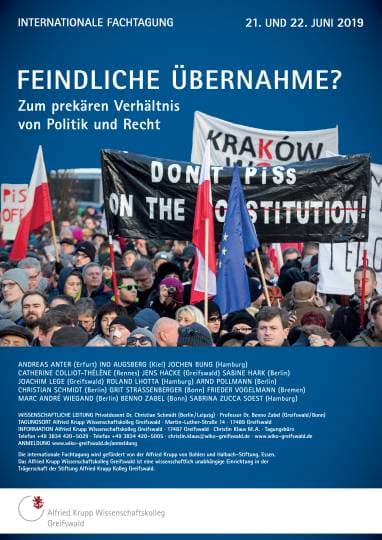Upcoming Talks
2025
A talk on the conceptual history of “responsibility” in the lectures series of the Forschungskolloquium Zeitgeschichte.
Genealogy has become a lively debated method but is currently stripped from some of its defining features: (a) the destruction of the origin; (b) the emphasis on conflicts in which ideas, concepts and practices emerge; (c) the spotlight on the bodies on which this violent history leaves its mark.
A talk on Foucault’s concepts of experience.
A conversation with Jan Groos of Future Histories about the public at the conference Politische Öffentlichkeit: Strukturen in Erfurt.
2024
The argument presented in the talk aims to show that intertwining epistemology with social and political theory must transforms of both sub-disciplines, due to three basic requirements: minimal materialism, radical self-reflection and epistemic non-sovereignty.
The argument presented in the talk aims to show that intertwining epistemology with social and political theory must transforms of both sub-disciplines, due to three basic requirements: minimal materialism, radical self-reflection and epistemic non-sovereignty.
In diesem Vortrag untersuche ich verschiedene Varianten von Beispielkritik in der Philosophie, wobei ich mich auf die Art von Wirklichkeit konzentriere, die Beispiele in die Philosophie einführen. Kritik verdienen sie vor allem, so möchte ich zeigen, wenn sie diese Wirklichkeit vorschnell von Konflikt und Kontingenz reinigen.
Der Vortrag untersucht nicht, warum wissenschaftliche Erkenntnisse gelten, sondern woher die Idee kommt, sie als geltend zu beschreiben.
Prof. Dr. Frieder Vogelmann (Albert‐Ludwigs‐Universität Freiburg) wird sein Buch „Umkämpfte Wissenschaften“ und ihre Bedeutung in der Gesellschaft vorstellen. Der Vortrag findet am Montag, 21. Oktober 2024, 19 Uhr im Vortragssaal des Stadtarchivs Stuttgart statt.
Genealogy has become a lively debated method but is currently stripped from some of its defining features: (a) the destruction of the origin; (b) the emphasis on conflicts in which ideas, concepts and practices emerge; (c) the spotlight on the bodies on which this violent history leaves its mark.
We crtically assess the recent idea of a “European” political epistemology.
In this talk, I present an interpretation of Michel Foucault’s philosophical method.
Book Launch at the Research and Teaching Area Political Theory at Humboldt University Berlin.
Talk and roundtable discussion with Prof. Dr. Christian Meyer & Prof. Dr. Sven Reichardt (Universiy Konstanz).
Gegen den nostalgischen Positivismus, der die »spontane Philosophie« der Wissenschaften dominiert, argumentiere ich für ein realistisches Verständnis wissenschaftlicher Praktiken – das allerdings die Umstellung auf eine nicht-souveräne Erkenntnistheorie erfordert, deren Grundidee ich in dem Vortrag skizziere.
Roundtable at the congress Demokratie in Sachsen at the Else Frenkel-Brunswik Institut.
Against the nostalgic positivism that dominates the currrent “spontaneous philosophy of science”, I argue for a realistic understanding of scientific practices. That, however, requires a non-sovereign epistemology, the outlines of which I will sketch in this talk.
With talks by Viktoria Huegel (Wien), Martin Nonhoff (Bremen), Rieke Trimçev (Erlangen) and Frieder Vogelmann (Freiburg).
A discussion between Frieder Vogelmann and Melanie Altanian about the new book Umkämpfte Wissenschaften – zwischen Idealisierung und Verachtung in jos fritz bookshop in Freiburg.
2023
Against science denialism and uncritical idealisation of the sciences, I argue for a realistic understanding of scientific practices.
The argument presented in the talk aims to show that intertwining epistemology with social and political theory must transforms of both sub-disciplines, due to three basic requirements: minimal materialism, radical self-reflection and epistemic non-sovereignty.
Eine Diskussion zwischen Frieder Vogelmann und Regina Schidel über das Buch Umkämpfte Wissenschaften – zwischen Idealisierung und Verachtung in der Karl Marx Buchhandlung in Frankfurt am Main.
How should we react to untruths in politics, if we do not want to affirm the false diagnosis of a “posttruth era”?
The argument presented in the talk aims to show that intertwining epistemology with social and political theory must transforms of both sub-disciplines, due to three basic requirements: minimal materialism, radical self-reflection and epistemic non-sovereignty.
My contribution the international conference Futuring Critical Theory at the Institute for Social Research in Frankfurt/Main, on the occasion of its 100th anniversary.
In this talk, I will show how philosophy produces the widespread, if often implicit, claim that there is a contradiction between the truth and the effectiveness of knowledge. Once we see how the supposed contradiction is constituted, we will be able to free ourselves from it and arrive at a concept of knowledge as effective and true.
What are the requirements for conceptions of academic freedom beyond a narrow legal conceptualisation?
How does politics relate to science – and should politics relate to science?
What are the requirements for conceptions of academic freedom beyond a narrow legal conceptualisation?
Die populäre Diagnose eines »postfaktischen Zeitalters« trifft auf gravierende historische, begriffliche und erkenntnistheoretische Einwände und verbreitet ein idealisiertes Bild einer einheitlichen Wissenschaft. Dagegen entwickele ich im Vortrag eine Alternative.
A Workshop on my book Die Wirksamkeit des Wissens. Eine politische Epistemologie at the Potsdam Center for Post-Kantian Philosophy.
Truth is a contested concept, yet that concept takes place in an idealist picture leading to a sovereign understanding of truth. In light of the problems it creates, I propose a materialist picture that helps us to understand the internal conception between truth and politics.
Vortrag auf dem Workshop Welches Wissen (und welche Wissenschaft) braucht die Politik? Herausforderungen wissensbasierter Demokratie
Buchvorstellung und Diskussion mit Nadja Germann, Nicola Gess und Daniel Loick; moderiert von Ulrich Bröckling.
Vortrag im Rahmen der Vorlesungsreihe Im Dialog. Wissenschaften und ihr Publikum
What are the requirements for conceptions of academic freedom beyond a narrow legal conceptualisation?
How to defend scientific practices against the rise of untruth in politics without succumbing to scientism?
Truth is a contested concept, yet that concept takes place in an idealist picture leading to a sovereign understanding of truth. In the talk, I propose a materialist picture instead that helps us to understand the internal conception between truth and politics.
2022
Lecture for the lecture series “Michel Foucault und die Philosophiegeschichte”
Talk at the conference “Transformations of the Political. Radical Democratic Theory for the 2020s”
Vortrag auf der Tagung “Rationalität und Demokratie”
Inaugural lecture at the Faculty of Humanities of Albert-Ludwigs-University and University College Freiburg.
Input for the workshop Theorie im “postfaktischen Zeitalter”
A look at the relationship of authority and reason in Horkheimer’s early articles and contemporary accounts of the new authoritarianism.
The diagnosis of a “post-truth era” is popular but wrong: historically, conceptually, politically. Yet there is a grain of truth in it: we should be concerned with the rise of untruth in politics. I argue that non-sovereign conceptions of truth and knowledge from feminist epistemology can help to defend scientific practices epistemically against science denialism without succumbing to scientism.
2021
In diesem Vortrag stelle ich am Beispiel der Diskussion über das »postfaktische Zeitalter« und die Rolle der Wissenschaften vor, was politische Epistemologie ist und wofür wir sie brauchen.
Internationale Fachtagung unter der wissenschaftlichen Leitung von Privatdozent Dr. Christian Schmidt (Berlin) und Professor Dr. Benno Zabel (Bonn).
In der Vortragsreihe »Was Wissen schafft« laden Mesut Bayraktar und Matthias C. Kettemann Forscher*innen aus unterschiedlichen Disziplinen ein, darüber nachzudenken, wie die Wissenschaft Wissen schaffen, was Wissen dann schafft, und wie es sinnstiftend, orientierungsgebend und handlungsleitend ausgespielt werden kann.
Eine Podiumsdiskussion über Universitäten im postfaktischen Zeitalter.
In dem Vortrag präsentiere ich eine realistische Betrachtung wissenschaftlicher Praktiken gegen ihre Verleugnung und Verherrlichung.
2020
The rise of untruth in politics has mostly been met by a stout defense of a robust notion of truth and an equally robust notion of the sciences. Yet all too often, this answer sacrifices the results of critically examinations of actual practices in the sciences and humanities. This article outlines a response for critical theories that enables them to defend truth and objectivity against organized climate change denialists or political propagandists without embracing a naïve positivism about …
In diesem Vortrag rekonstruiere ich die eigenständige Form kritischer Philosophie, die Martin Saar in den letzten Jahren Schritt für Schritt entwickelt hat.
In the talk I argue that political epistemology should include four often neglected research traditions with similar ambitions: Frankfurt School Critical Theory, Feminist Epistemology, Poststructuralism and Postcolonial Theory.
The goal of this section is to reconsider the relationship between knowledge and politics.
A proposal for an understanding of truth as an epistemic force that emergates in social practices.
Der Vortrag beleuchtet die gravierenden Probleme der Diagnose eines “postfaktischen Zeitalters” und erinnert an die Vor- und Nachteile alternativer Begriffe zu Diagnose von Unwahrheit in der Politik.
Roundtable discussion on critiques of reason
The workshop is organized by Daniel Loick und Ludger Schwarte.
Programm
Freitag, 17. Januar 2020
Moderation: Ludger Schwarte
13.00-13.30: Daniel Loick, Ludger Schwarte: Begrüßung und Einführung
13.30-14.30: Bertram Lomfeld: “Eine Grammatik der Kritik? Zur diskursiven (Re)Konstruktion des Rechts”
2019
Basiert auf der Veranstaltung “Vernunftkritik in der kritischen Theorie”.
The talk is part of the conference The Concept of Progress at the University of Bremen, organized by Martin Saar, Frank Nullmeier, Martin Nonhoff and Frieder Vogelmann.
The task of diagnosing the present explains how Foucault’s critique functions as a philosophical practice, and by making explicit in which ways it emancipates us, it gives us reasons why we might be interested in doing critique like that.
A defense of radical critiques of reason against the champions of “post-critical” thinking and the decriers of “post-truth”.
Drei Lesarten von Michel Foucaults Position zur Ontologie des Politischen.
Im Workshop sollen anhand von Foucaults Vorlesungen seine methodologischen Vorschläge diskutiert werden, zu einer anderen Form philosophischer und historischer Forschung zu gelangen.
Die Responsibilisierung unseres Denkens führt zur Herrschaft eines bestimmten Gebrauchs von “Verantwortung”, der unsere Denk-, Handlungs-, und Seinsweisen bestimmt.
Seit 250 Jahren antwortet die politische Philosophie auf die Frage, wie so regiert werden kann, dass die Regierten keine Angst vor den Regierenden haben müssen, mit dem Prinzip der Autonomie. Es ist damit als unhintergehbares Lösungsprinzip der politischen Philosophie zur Sackgasse für unsere politische Vorstellungskraft geworden.
A workshop on some preliminary chapters from my new book Effective Knowledge. Rethinking a Basic Concept of Political Epistemology.
How can we govern so that those governed need not fear those governing? And what if the familiar answer of political liberalism, namely “autonomy,” turns out not to meet this criterion?
Der Roundtable ist Teil des Workshops “Hochschullehre in der Politischen Theorie und Ideengeschichte: Selbstverständnis, Praxis, Perspektiven”, organisiert von Andreas Busen, Dannica Fleuß und Alexander Weiß mit Unterstützung des Arbeitskreises Hochschullehre der DVPW.
Ohnmacht und Intensivierung. Zur Logik des Verantwortungsbegriffs in Lohnarbeit und Arbeitslosigkeit
Der Gebrauch von “Verantwortung” unterliegt einem Wandel, der sich entgegen prominenter Diagnosen weder als “Diffusion” noch als “Individualisierung” begreifen lässt. Vielmehr intensiviert er den Selbstbezug von Verantwortungsträger_innen und die Machtasymmetrien zwischen ihrer Subjektposition und jener der Verantwortungszuschreiber_innen. Der Vortrag diskutiert die Folgen dieses Vorgangs.

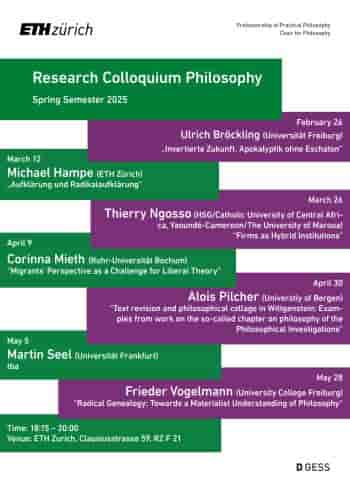
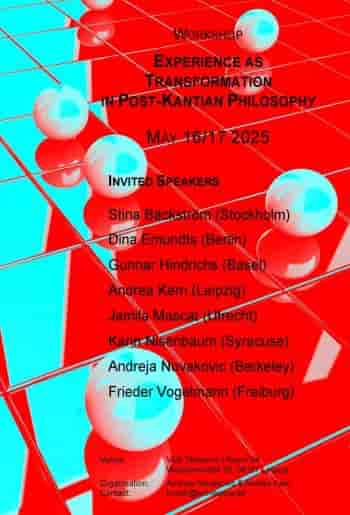
![Political Epistemology without Apologies [in German]](/public/event/2025/2025-01-28_leipzig_pe/featured_philkoll_pic.jpg)
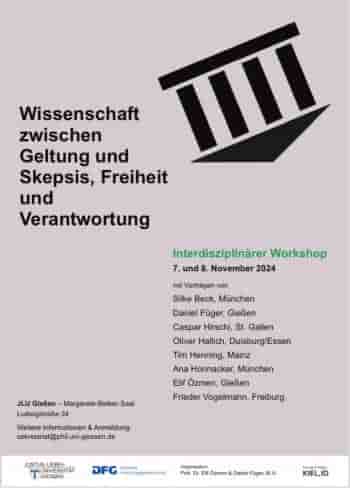
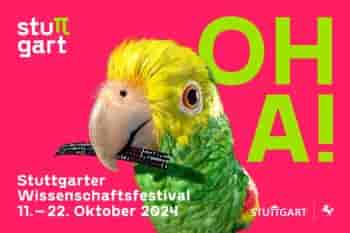

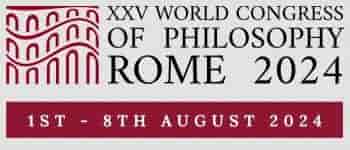
![Dig and Grab: Philosophising with and after Foucault [in German]](/public/event/2024/2024-07-03_fouc_ffm/featured_ffm_fouc.jpg)
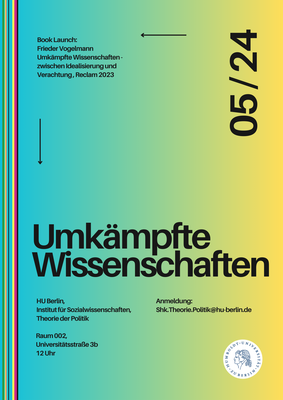
![Roundtable “Fact and Trouble -- Democracy in Focus” [in German]](/public/event/2024/2024-05-30_leipzig/featured_efbi.jpg)
![Contested Sciences, Fragile Truths: On the Merits of a Non-Sovereign Epistemology [in German]](/public/event/2024/2024-05-22_goettingen/featured_goetiingen.jpg)
![Postfoundationalism. Workshop on the book project by Sara Gebh & Sergej Seitz [in German]](/public/event/2024/2024-04-19_wien_postfundamentalismus/featured_plakat-pofu-1_1.jpg)
![Contested Sciences -- between Idealisation and Disdain [in German]](/public/event/2023/2023-12-12_luzern/featured_Philkoll_HS23_web_1.jpg)
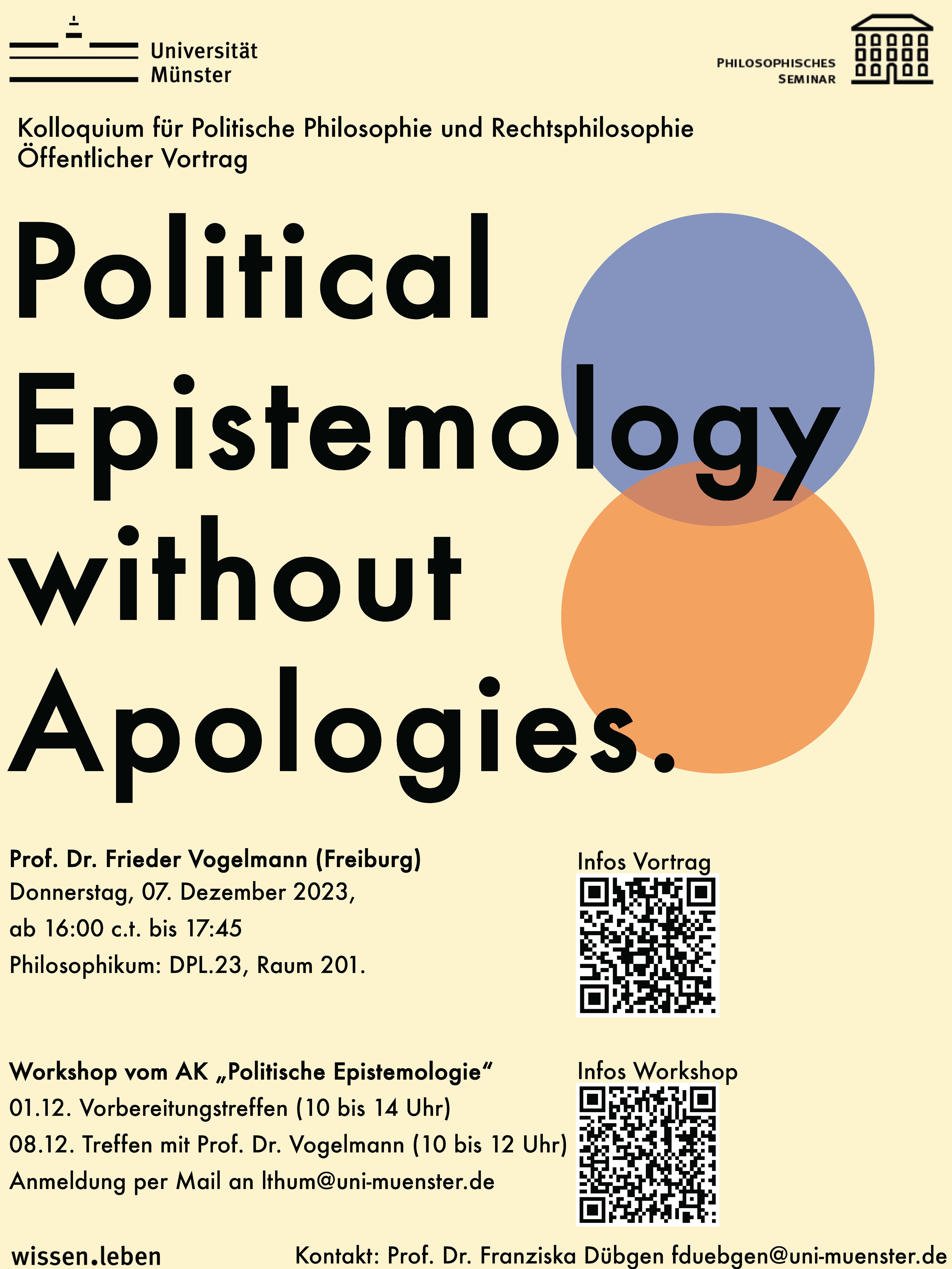

![How to Cope With Untruth in Politics? [in German]](/public/event/2023/2023-10-10_basel/featured_basel_jenseits_pf.jpg)
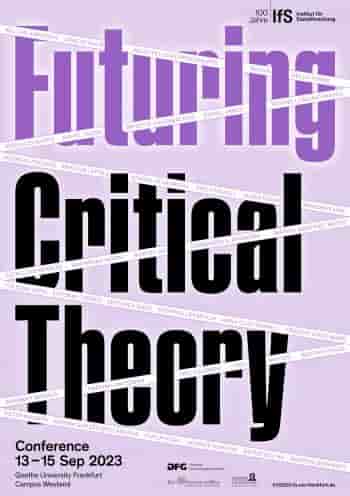

![The Effectivity of Knowledge: Workshop with Frieder Vogelmann in Frankfurt/Main [in German]](/public/event/2023/2023-05-11_ffm_workshop_ww/featured_poster_ww.jpg)
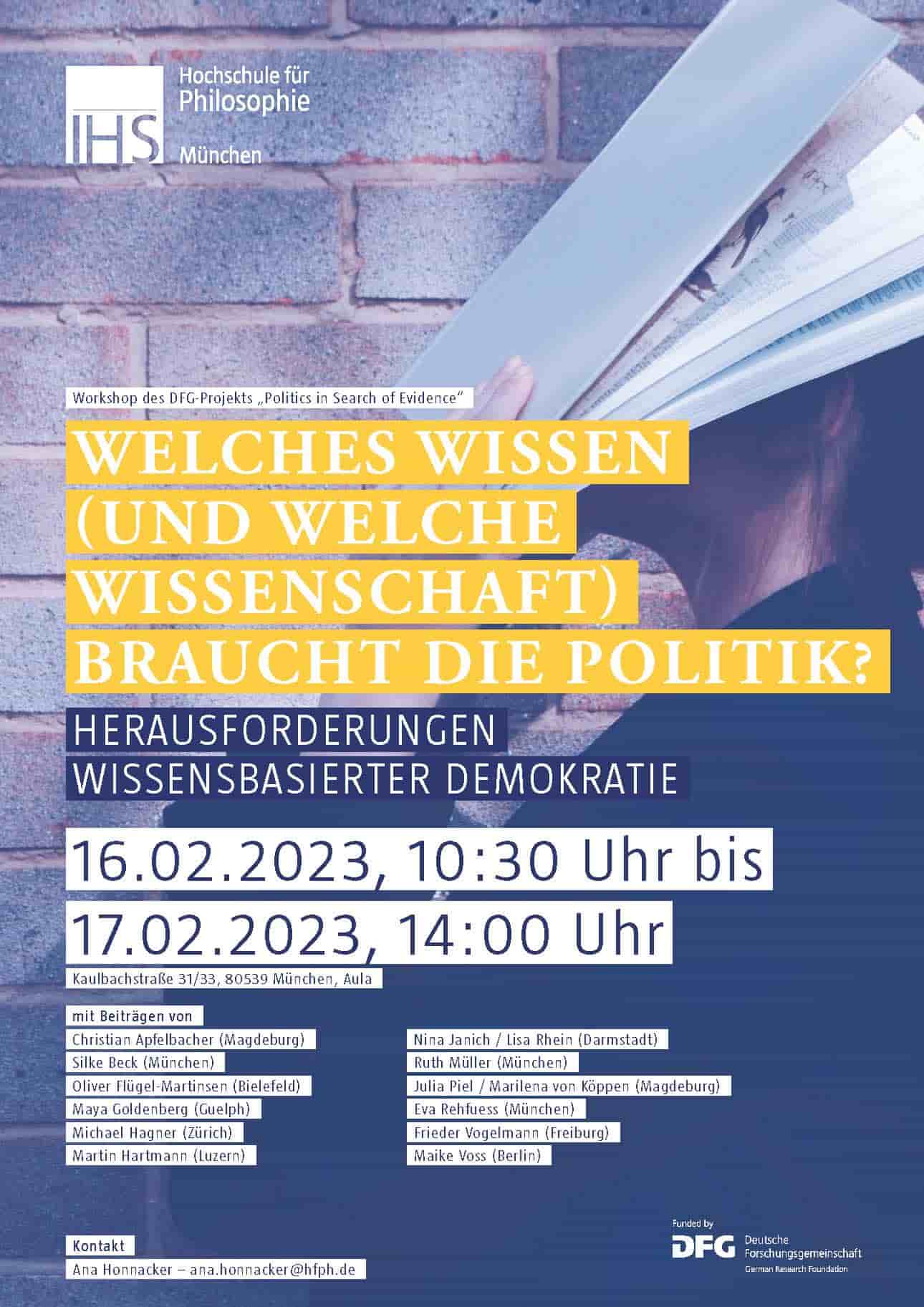
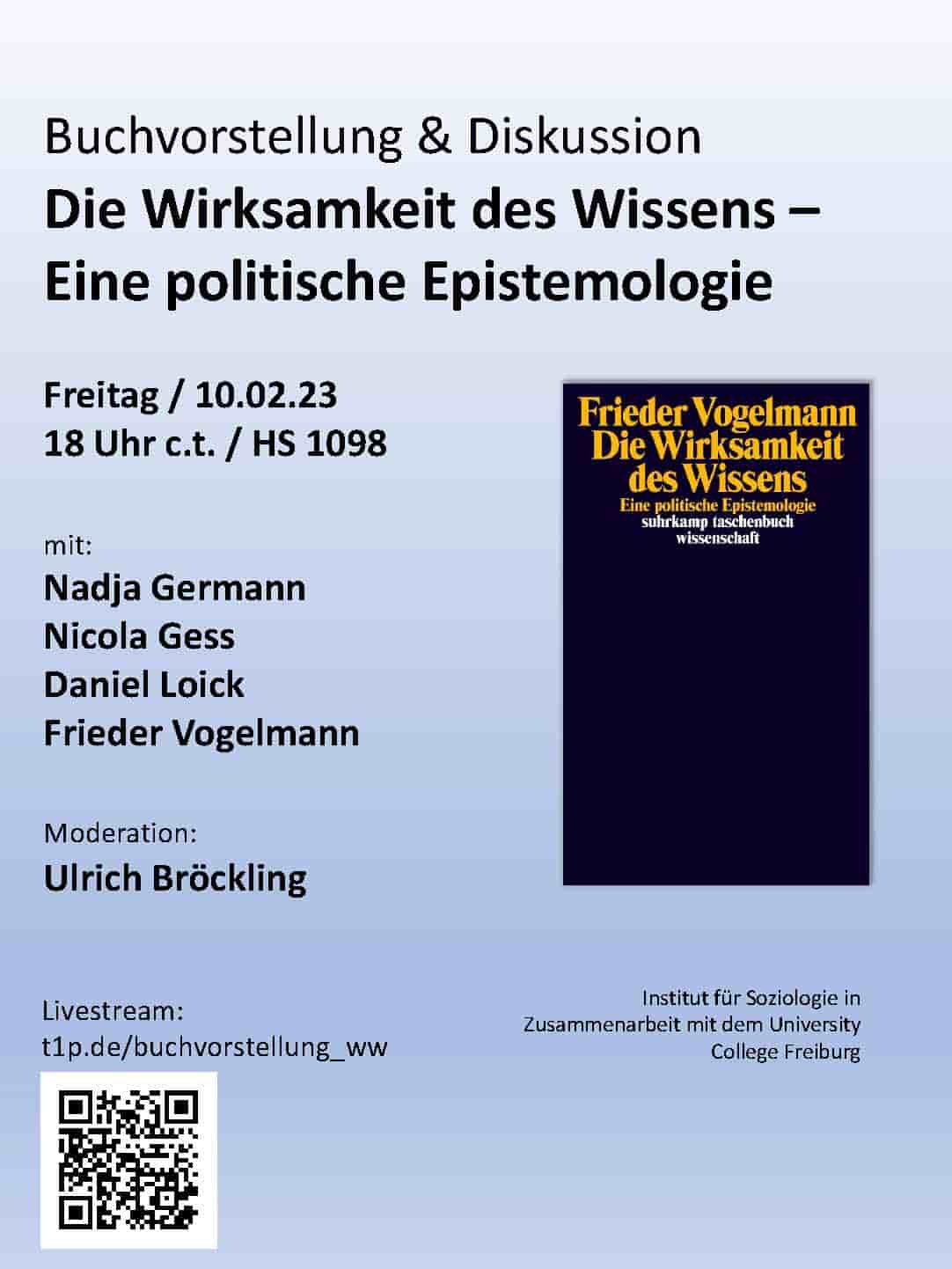
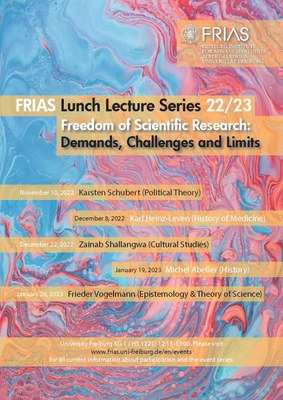
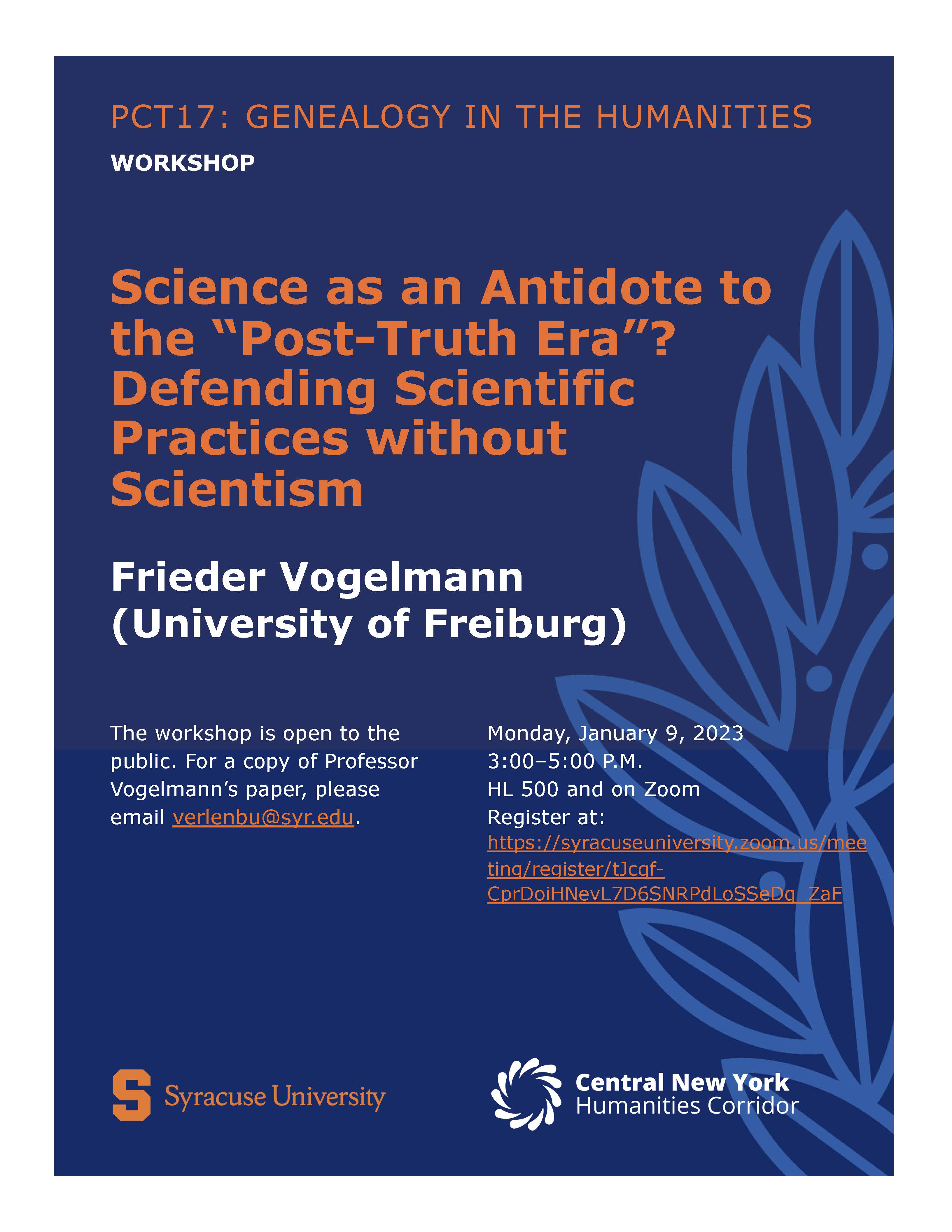
![Opponents, Elective Relatives -- Material? Foucault's Usage of the History of Philosophy [in German]](/public/event/2022/2022-12-12_duesseldorf_foucault/featured_cgw2020_final.jpg)
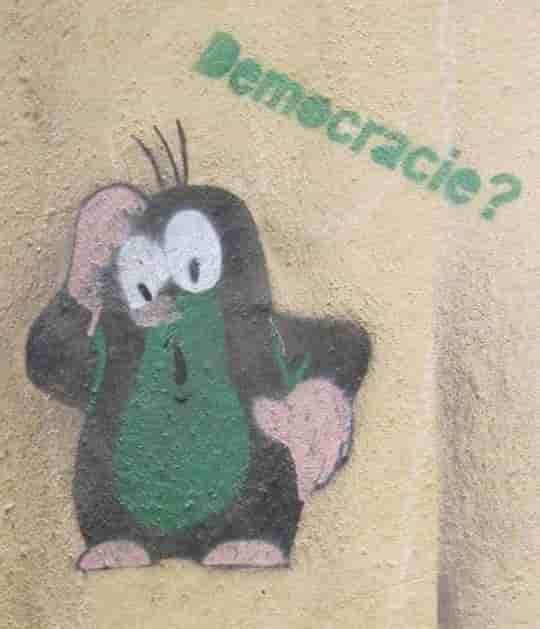

![Wisdom’s friend and all the world’s enemy? Philosophy with, in and against the world [in German]](/public/event/2022/2022-07-21_freiburg_antritt/featured_Vogelmann_ETS_Antrittsvorlesung.jpg)
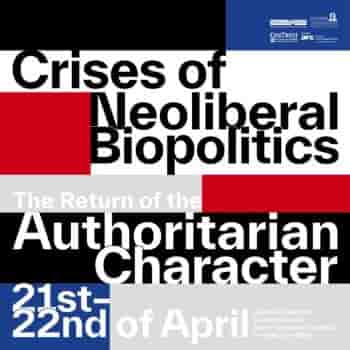
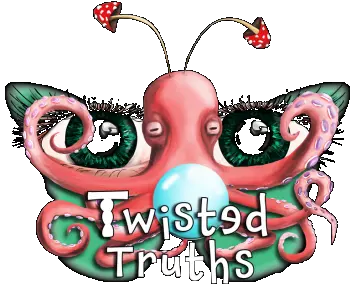
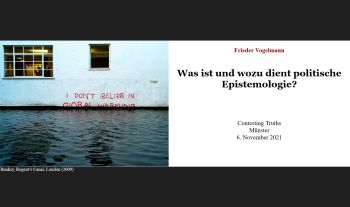
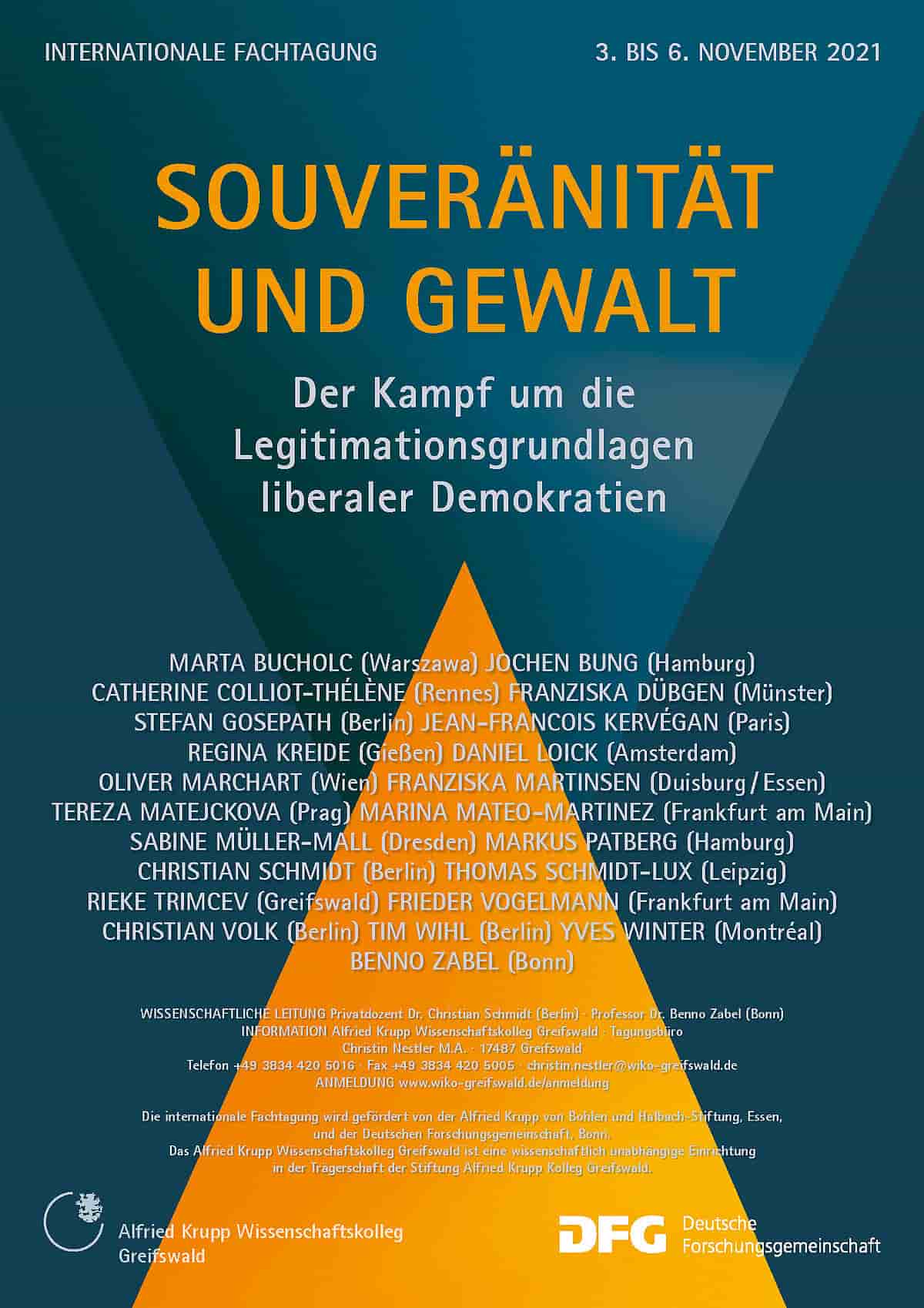
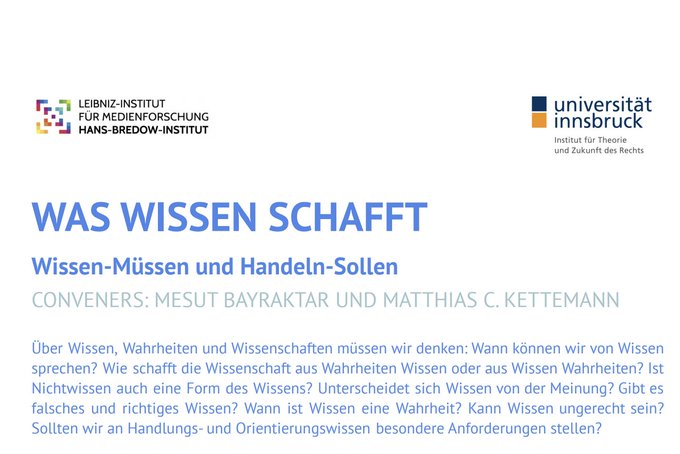
![Populismus und das postfaktische Zeitalter: Eine Krise der Universität? [in German]](/public/media/Buergeruni_2021_Infoscree.jpg)
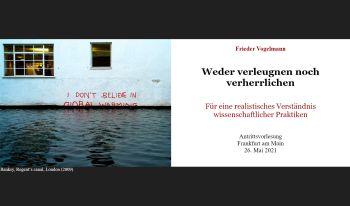
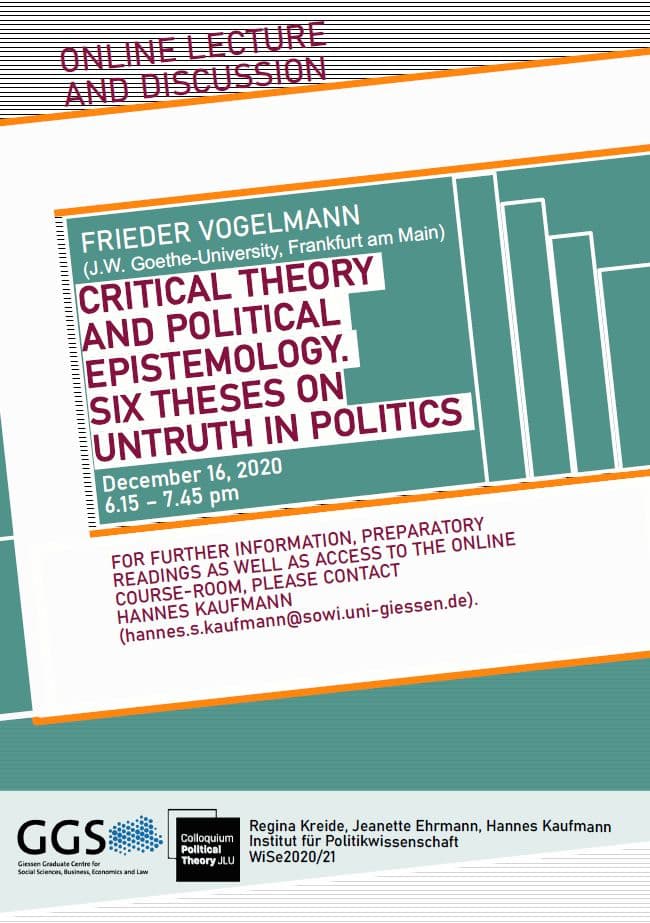
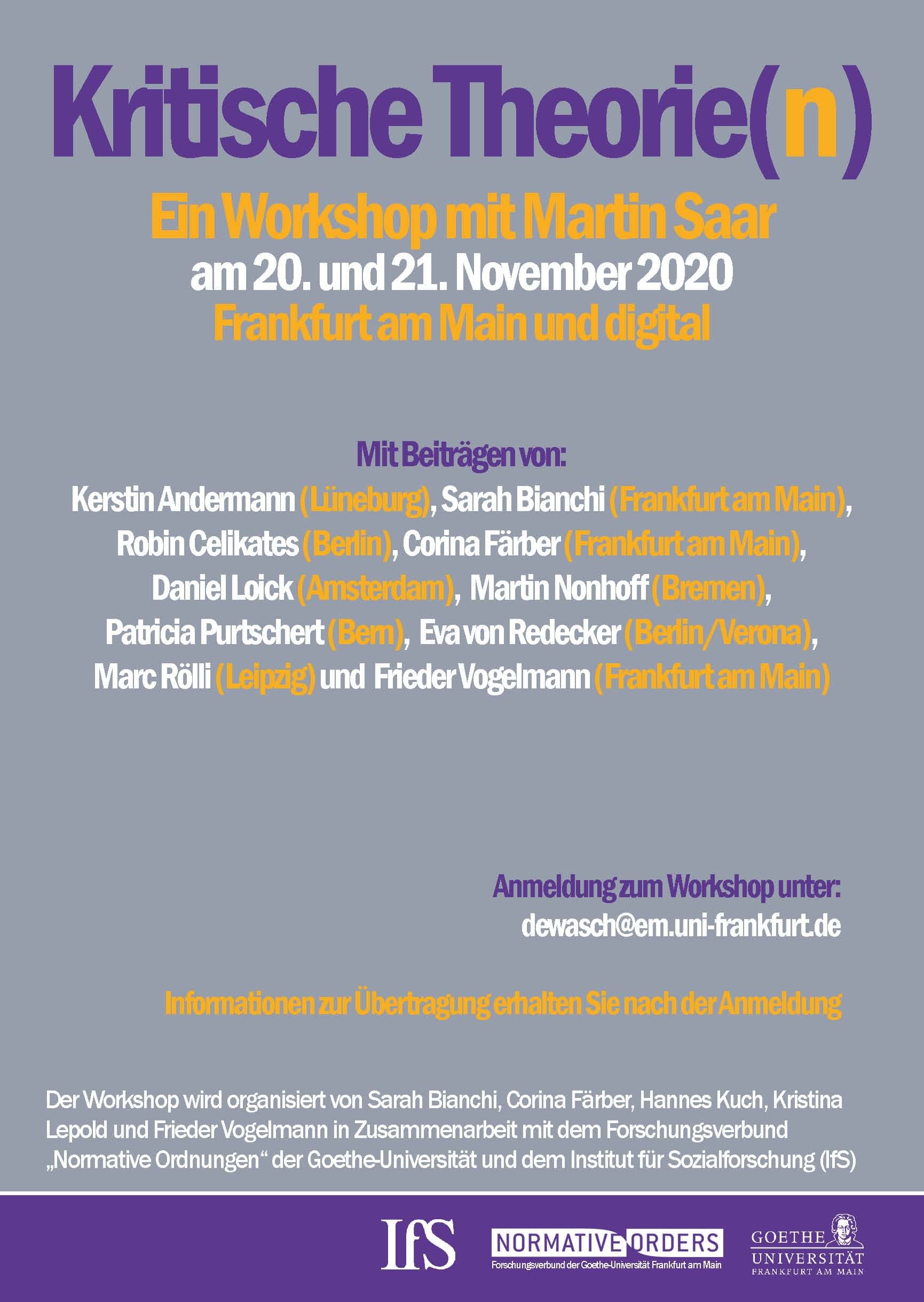
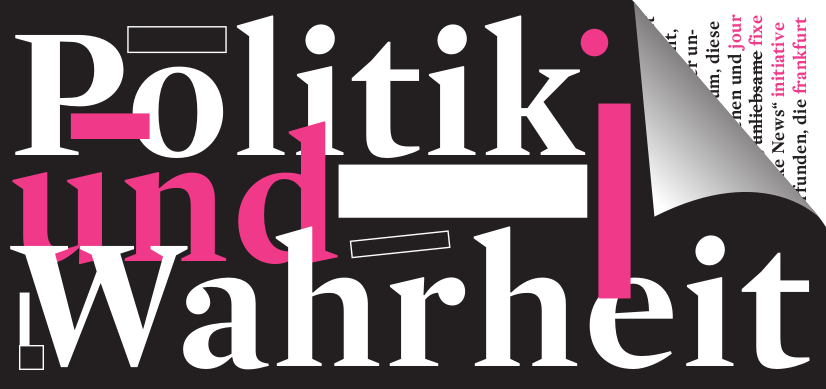
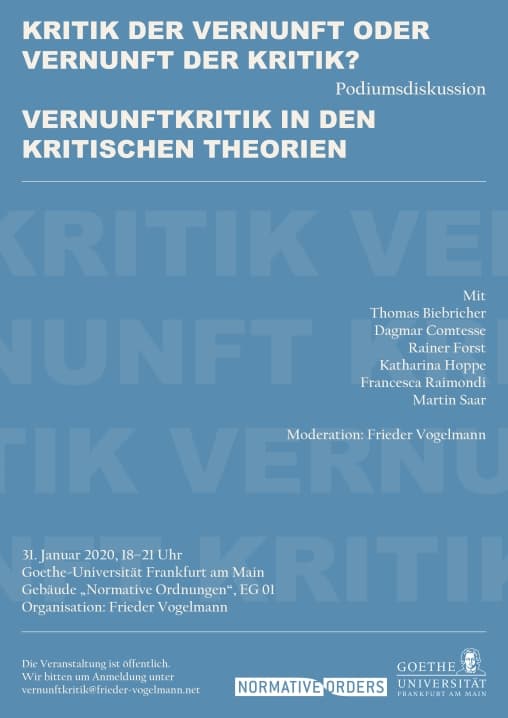
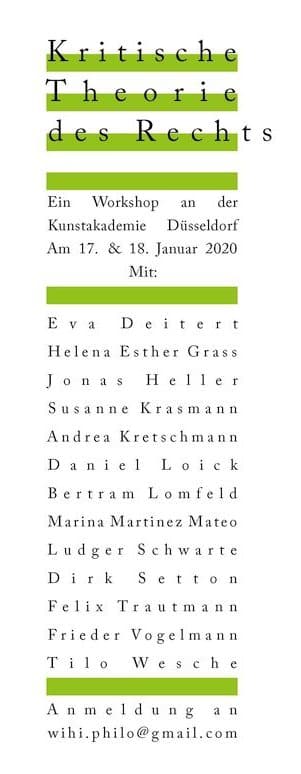
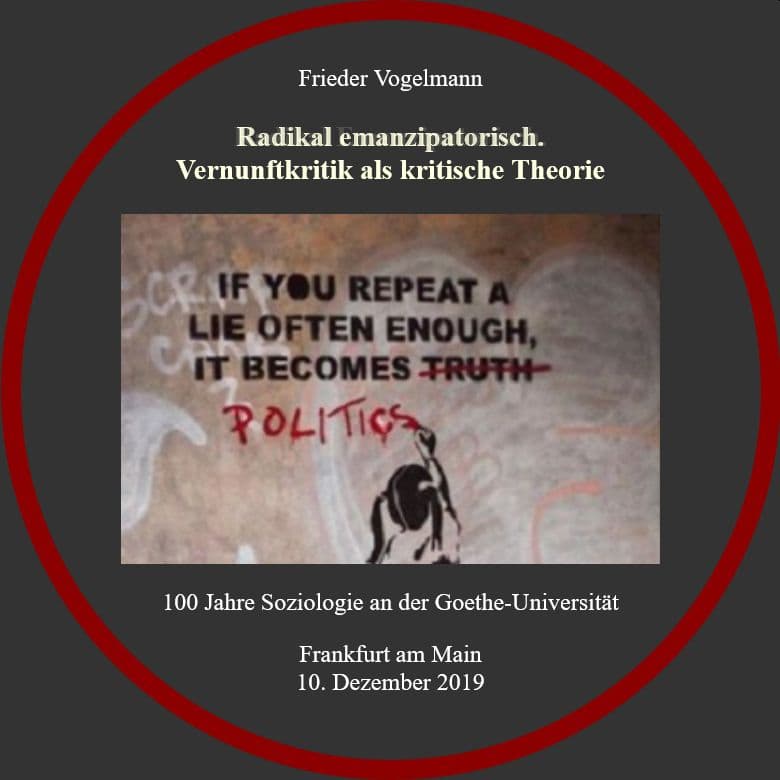
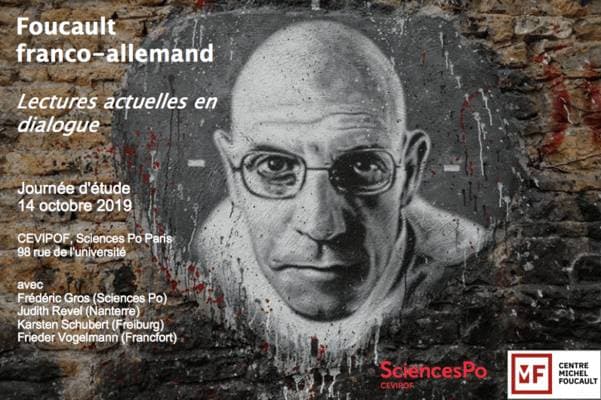
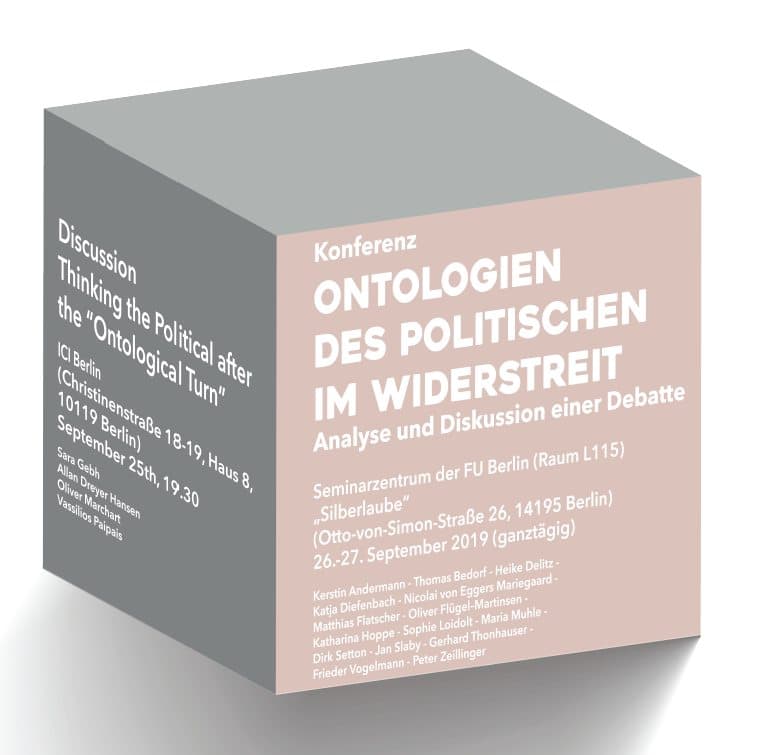
![Conference “Philosophie, Kritik, Geschichte: Foucaults historisch-philosophische Praxis in den Vorlesungen” [in German]](/public/event/2019/2019-07-30_frankfurt/featured_poster_foucault_ffm.png)
